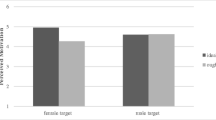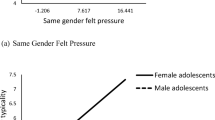Abstract
Middle-class adolescent boys and girls with strong attitudes for and against the sex-role ideology of the Women's Movement were administered a Q-sort to study two aspects believed to be related to identity formation: flexibility-rigidity and independence-dependence. A significant positive relationship was found, more strongly for independence than for flexibility and more strongly for girls than for boys. More favorable attitudes toward sex-role equalitarianism were associated with flexibility and independence. The strength of the associations varied with the nature of the Q-sort: ideal self, self as ideal member of opposite sex, and self as ideal to each parent.
Similar content being viewed by others
References
Adorno, T. W., Frenkel-Brunswick, E., Levinson, D. J., and Sanford, R. N. (1952).The Authoritarian Personality, Harper and Row, New York.
Cherniss, C. (1972). Personality and ideology: A personological study of Women's Liberation.Psychiatry 35: 109–125.
Erikson, E. (1968). Identity. InYouth and Crisis, Norton, New York.
Hauser, S. (1971).Black and White Identity Formation, Wiley, New York.
Rokeach, M. (1960).The Open and Closed Mind, Basic Books, New York.
Spence, J. T., and Helmreich, J. (1973).The Attitudes Towards Women Scale: An Objective Instrument to Measure Attitudes Towards the Rights and Roles of Women in Contemporary Society, APA Journal Supplement Abstract Service, Washington, D.C.
Stoloff, C. (1973). Who joins Women's Liberation?Psychiatry 36: 325–340.
Worrell, J., and Worrell, L. (1971). Supporters and opposers of Women's Liberation: Some personality correlates. Paper presented at the APA Convention, Washington, D.C., September.
Author information
Authors and Affiliations
Additional information
This article is based on the dissertation by Dr. Kirsch in partial fulfillment of the Doctor of Philosophy Degree at the Graduate School of Education, University of Marylandm, College Park, Maryland
Psychotherapist in private practice in Potomac, Maryland, with special interest in psychology of women. Received her Ph.D. in human development from the University of Maryland, Graduate School of Education, in 1974.
Received his Ph.D. in clinical psychology from Boston University in 1955. Diplomate in clinical psychology (ABPP). Interest is adolescent development with emphasis on innovative programs for optimal growth as well as treatment services.
Received his Ed.D. in human development from the University of Maryland in 1961. Current interest is in developing preservice education programs for Middle School personnel.
Rights and permissions
About this article
Cite this article
Kirsch, P.A., Shore, M.F. & Kyle, D.G. Ideology and personality: Aspects of identity formation in adolescents with strong attitudes toward sex-role equalitarianism. J Youth Adolescence 5, 387–401 (1976). https://doi.org/10.1007/BF01577251
Received:
Issue Date:
DOI: https://doi.org/10.1007/BF01577251




